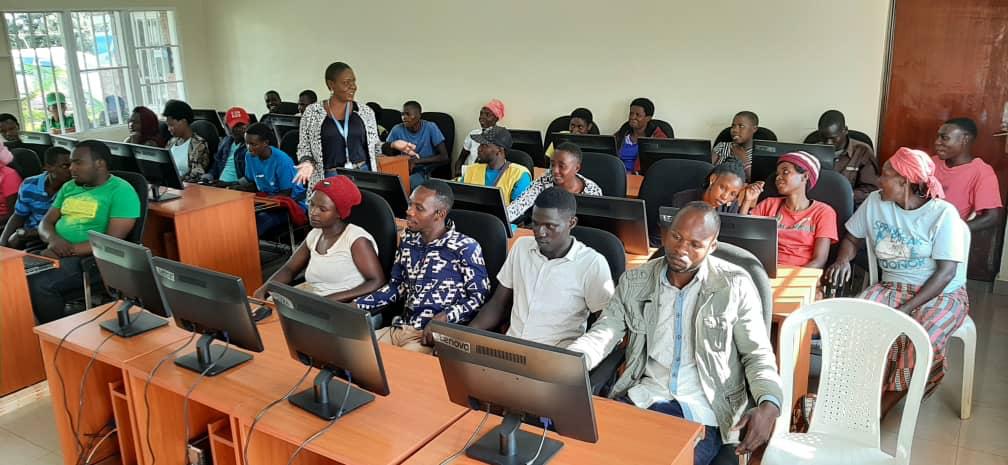Can we find the right partnerships to ensure operation of rural ICT learning centres?
Local authority: City of Kigali
Country: Rwanda
Kigali is home to a significant number of young people. However, the level of digital skills within this age group in Kigali is split. While some are digitally literate, there are groups who have an interest in ICT technologies but are at a disadvantage in terms of the skills required to meaningfully engage with them. The City of Kigali (CoK) would therefore like to tackle the digital divide and engage youth in ICT to promote civic participation and social connectedness.
The Local Action Plan for the City of Kigali concerns building a network of ICT Centres for rural communities who may not otherwise have access to computers. The ICT Centres will be situated at strategic public places, where people can access computers, the Internet, and other technologies as they develop digital skills and look for work.
The experimentation phase looked to test this approach in one specific location as a pilot phase. The local team wanted to find popular and useful training courses, see how many young people they could attract to classes, and assess the demographic composition of those attending. They also wanted to find the right business model to cover some of the operational costs, including attracting local partnerships to contribute towards costs through direct financing or in-kind support.
ASSUMPTIONS:
• We believe the Centre can find the right business model to cover operational costs (cleaning, water and electricity bills etc).
• We believe there are local funding partners who are interested in funding the rest of operations (internet connection, training, salaries etc).
How the Local Action Group tested it
• Undertook procurement for the renovation and equipment needed for the identified space in Nduba Sector.
• Took meetings with various organisations to help set up the ICT Centre. These included Internet Service Providers (ISPs), of whom the team felt confident to partner with due to recent projects they had completed together.
• Met with a youth-focused NGO who had an existing agreement with the City of Kigali. The NGO agreed to develop training modules for the ICT centre and provide staff for free to conduct the courses during the pilot phase.
• The centre was opened without a dedicated manager while discussions on resourcing continued.
What they learned
Multiple procurement issues held back the opening of the centre. There were several interesting procurement challenges the team encountered. Firstly, the local team tried to use an existing tender contract for ICT equipment, however, only computers were listed in the contract so the local group had to start a new, lengthy procurement process later on. Another procurement challenge was the delay in the delivery of purchased furniture, because the requested items were not similar to those previously provided by the supplier. This meant the city had to re-advertise a public tender of up to 24 days for the new table specifications. Procurement issues also extended into the recruitment of security staff for the Centre, as government requirements for procurement were slow and ill-matched for the pilot’s needs.
The local authority failed to form strategic partnerships where they were identified. The local team were confident that training modules and the trainers themselves would be provided through the existing agreement the City of Kigali had with the previously-mentioned NGO. However, later down the line, CoK were quoted a large amount to develop the training modules, and a request was also made for the local authority to provide the trainers themselves. This severely impacted the vision for delivery of the ICT Centre, and the local authority has reflected that they might have tried to formalise such agreements earlier on to learn this sooner.
Finding a manager for the ICT centre was harder than anticipated. As well as challenges related to partnerships, the City of Kigali also struggled to hire a centre manager. They had anticipated using staff from Nduba Sector after being advised that contractual staff should go through a recruitment process that would take longer than 3 months. However, it was difficult for the Sector to make this a reality and they eventually engaged an intern who was already with the Sector to manage the site and provide basic training. They are currently in discussions with the national ICT agency (RISA) to provide a “digital ambassador” as a future centre manager.

Students participating to a training
Was the assumption validated?
No the team learnt that:
• It wasn’t possible to engage prospective partners to achieve some of the cost savings they were hoping to achieve in Public-Private partnerships.
• It remains to be seen whether the local authority can pivot to provide the Centre manager, trainers and create training modules for students in-house or at minimal cost.
What next?
The City of Kigali wants to change its strategy with regards to teaching courses, where they now want to produce modules internally via the national ICT Department and give them to selected interns to teach students.
Nevertheless, the local authority still wants to continue engaging partners and sign agreements with those willing to support the project for their corporate social responsibility aims.
Other reflections include the potential to create a separate management team who include people other than the City of Kigali staff, such as partners from civil society or the private sector. This would seemingly increase the ownership of these parties in the project.



